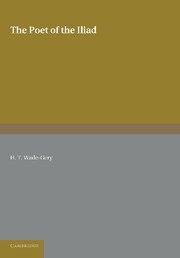II - THE POET'S DESCENDANTS
Published online by Cambridge University Press: 05 June 2016
Summary
HOMERIDAI
THERE was in Chios a clan or family called Homeridai: on the face of it, the name means the descendants of Homer. The simple conclusion, that omer's descendants were alive and known in historic times, has been contested by scholars, both ancient and modern: at the end of the Hellenistic period by the grammarian Seleukos, and in the present century by Wilamowitz. Both these scholars maintained that the name ‘Homeridai’ had no connection with the poet's name. They derived it from the Greek noun homeros (a hostage or follower). Seleukos said that the Homeridai were descended from some kind of hostages; Wilamowitz asserted that they were acolytes at certain sacrifices (Opferdiener).
The obstacles in the way of this thesis are formidable: to Pindar, to Plato, to Isokrates, ‘Homeridai’ meant people whose prime concern was the poet Homer. How Seleukos digested this difficulty we do not know. Wilamowitz cut the knot by asserting that there were two softs of Homeridai, totally distinct from each other: the Chiot family (who had nothing to do with the poet), and the Homeridai known to Pindar, Plato, and Isokrates (who had nothing to do with the Chiot family). Homeridai, in this second sense, is just a fancy name for Homeric rhapsodes.
I do not know that I need to refute this extravagant hypothesis. The burden of proof lies on those who maintain that Pindar and Akousilaos, almost exact contemporaries, meant different things by the same word: Pindar spoke of Homeridai as performers of epic poetry, Akousilaos spoke of them as a Chiot family. The only Homerid of whom we have any substantial knowledge, Kynaithos the Chiot rhapsode, was a rather older contemporary of these two men. About 500 B.C. the Homeridai were people of real importance; they were members of a Chiot family and they gave performances of Homer's works.
In the course of the fifth century they lost this importance. As performers of Homer's works they probably never had anything like a legally protected monopoly, and when the pubhc performance of poetry came to be a matter of competitive technique, such monopoly as they had in practice was invaded (during the fifth century) by the ‘star’ performers, men like Pratys, and the Ephesian Ion.
- Type
- Chapter
- Information
- The Poet of the Iliad , pp. 19 - 31Publisher: Cambridge University PressPrint publication year: 2013

